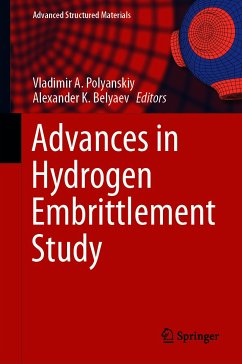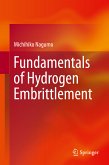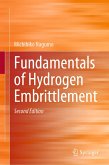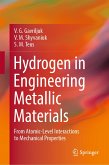Advances in Hydrogen Embrittlement Study (eBook, PDF)
Redaktion: Polyanskiy, Vladimir A.; Belyaev, Alexander K.
121,95 €
121,95 €
inkl. MwSt.
Sofort per Download lieferbar

61 °P sammeln
121,95 €
Als Download kaufen

121,95 €
inkl. MwSt.
Sofort per Download lieferbar

61 °P sammeln
Jetzt verschenken
Alle Infos zum eBook verschenken
121,95 €
inkl. MwSt.
Sofort per Download lieferbar
Alle Infos zum eBook verschenken

61 °P sammeln
Advances in Hydrogen Embrittlement Study (eBook, PDF)
Redaktion: Polyanskiy, Vladimir A.; Belyaev, Alexander K.
- Format: PDF
- Merkliste
- Auf die Merkliste
- Bewerten Bewerten
- Teilen
- Produkt teilen
- Produkterinnerung
- Produkterinnerung

Bitte loggen Sie sich zunächst in Ihr Kundenkonto ein oder registrieren Sie sich bei
bücher.de, um das eBook-Abo tolino select nutzen zu können.
Hier können Sie sich einloggen
Hier können Sie sich einloggen
Sie sind bereits eingeloggt. Klicken Sie auf 2. tolino select Abo, um fortzufahren.

Bitte loggen Sie sich zunächst in Ihr Kundenkonto ein oder registrieren Sie sich bei bücher.de, um das eBook-Abo tolino select nutzen zu können.
The book presents a collection of chapters on the current problems associated with hydrogen damage. It discusses the effect of hydrogen on material properties and its interaction with the material microstructure, physical features of hydrogen transport in metals and alloys, as well as applicable methods of measuring concentration of hydrogen in solid media.
- Geräte: PC
- ohne Kopierschutz
- eBook Hilfe
- Größe: 11.26MB
Andere Kunden interessierten sich auch für
![Fundamentals of Hydrogen Embrittlement (eBook, PDF) Fundamentals of Hydrogen Embrittlement (eBook, PDF)]() Michihiko NagumoFundamentals of Hydrogen Embrittlement (eBook, PDF)121,95 €
Michihiko NagumoFundamentals of Hydrogen Embrittlement (eBook, PDF)121,95 €![Fundamentals of Hydrogen Embrittlement (eBook, PDF) Fundamentals of Hydrogen Embrittlement (eBook, PDF)]() Michihiko NagumoFundamentals of Hydrogen Embrittlement (eBook, PDF)145,95 €
Michihiko NagumoFundamentals of Hydrogen Embrittlement (eBook, PDF)145,95 €- -29%11
![Hydrogen in Engineering Metallic Materials (eBook, PDF) Hydrogen in Engineering Metallic Materials (eBook, PDF)]() V. G. GavriljukHydrogen in Engineering Metallic Materials (eBook, PDF)113,95 €
V. G. GavriljukHydrogen in Engineering Metallic Materials (eBook, PDF)113,95 € ![Advances in Desiccant Dehumidification (eBook, PDF) Advances in Desiccant Dehumidification (eBook, PDF)]() Vivekh PrabakaranAdvances in Desiccant Dehumidification (eBook, PDF)121,95 €
Vivekh PrabakaranAdvances in Desiccant Dehumidification (eBook, PDF)121,95 €- -54%11
![Ferroalloys (eBook, PDF) Ferroalloys (eBook, PDF)]() Mikhail GasikFerroalloys (eBook, PDF)97,95 €
Mikhail GasikFerroalloys (eBook, PDF)97,95 € ![Electric Arc Furnace with Flat Bath (eBook, PDF) Electric Arc Furnace with Flat Bath (eBook, PDF)]() Yuri N. ToulouevskiElectric Arc Furnace with Flat Bath (eBook, PDF)40,95 €
Yuri N. ToulouevskiElectric Arc Furnace with Flat Bath (eBook, PDF)40,95 €![Materials Ageing in Light-Water Reactors (eBook, PDF) Materials Ageing in Light-Water Reactors (eBook, PDF)]() François CattantMaterials Ageing in Light-Water Reactors (eBook, PDF)233,95 €
François CattantMaterials Ageing in Light-Water Reactors (eBook, PDF)233,95 €-
-
-
The book presents a collection of chapters on the current problems associated with hydrogen damage. It discusses the effect of hydrogen on material properties and its interaction with the material microstructure, physical features of hydrogen transport in metals and alloys, as well as applicable methods of measuring concentration of hydrogen in solid media.
Dieser Download kann aus rechtlichen Gründen nur mit Rechnungsadresse in A, B, BG, CY, CZ, D, DK, EW, E, FIN, F, GR, HR, H, IRL, I, LT, L, LR, M, NL, PL, P, R, S, SLO, SK ausgeliefert werden.
Produktdetails
- Produktdetails
- Verlag: Springer International Publishing
- Seitenzahl: 213
- Erscheinungstermin: 13. März 2021
- Englisch
- ISBN-13: 9783030669485
- Artikelnr.: 61317418
- Verlag: Springer International Publishing
- Seitenzahl: 213
- Erscheinungstermin: 13. März 2021
- Englisch
- ISBN-13: 9783030669485
- Artikelnr.: 61317418
- Herstellerkennzeichnung Die Herstellerinformationen sind derzeit nicht verfügbar.
Prof. Dr. Vladimir A. Polyanskiy is the Head of the Institute for Problems in Mechanical Engineering of the Russian Academy of Sciences and Professor of the Higher School of Cyberphysical Systems and Control at Peter the Great St. Petersburg Polytechnic University. He is one of the developers of an industrial mass spectrometric hydrogen analyzer and of government reference specimen for calibrating hydrogen analyzers. He is a member of the North-West Branch of the Scientific Committee of the Russian Academy of Sciences on Combustion and Explosion and an expert of the Russian Academy of Sciences. His scientific interests include hydrogen embrittlement, structural strength, metallurgy, physics of the atomic collisions and computational mechanics. Prof. Dr.Sc. Dr.habil. Dr.h.c. Alexander K. Belyaev is the Head of the Mechatronics Laboratory and Chief Researcher of the Institute for Problemsin Mechanical Engineering of the Russian Academy of Sciences. He is a Professor of the Department of Theoretical and Applied Mechanics at St. Petersburg State University and Professor of the Higher School of Mechanics and Control at Peter the Great St. Petersburg Polytechnic University. He has a Honorary Doctorate (d.h.c.) of Johannes Kepler University, Linz, Austria in 2012, and is a Foreign Member of the Austrian Academy of Sciences in 2016. He is a Member of the Council of the European Mechanics Society (EUROMECH) and member of IUTAM, as well as Corresponding Member of the Russian Academy of Sciences, member of Presidium of Russian National Committee for Theoretical and Applied Mechanics. His scientific interests include high-frequency dynamics of solids and structures, stability of machines and mechanisms, mechatronics.
Short-range-ordering effects on hydrogen embrittlement of austenitic steels - a review.- The effect of hydrogen charging on TDS and bond energies.- The key role of dedicated experimental methodologies in revealing the interaction between hydrogen and the steel microstructure.- A contribution on the hydrogen diffusion controlled failure of notched samples.- Establishing elastic-diffusion properties interrelation for a material with microstructure typical of HIC.- Influence of linear elastic stresses on hydrogen diffusion into metals.- Effect of hydrogen concentration and strain rate on hydrogen embrittlement of ultra-fine grained low carbon steel.- Acoustoelasticity due to hydrogen embrittlement and skin effects.- Characterization of hydrogen trapping systems and HIC susceptibility of X60 steel by traditional and innovative methodologies.- Hydrogen charging of samples printed on 3D, against samples of conventional materials.
Short-range-ordering effects on hydrogen embrittlement of austenitic steels - a review.- The effect of hydrogen charging on TDS and bond energies.- The key role of dedicated experimental methodologies in revealing the interaction between hydrogen and the steel microstructure.- A contribution on the hydrogen diffusion controlled failure of notched samples.- Establishing elastic-diffusion properties interrelation for a material with microstructure typical of HIC.- Influence of linear elastic stresses on hydrogen diffusion into metals.- Effect of hydrogen concentration and strain rate on hydrogen embrittlement of ultra-fine grained low carbon steel.- Acoustoelasticity due to hydrogen embrittlement and skin effects.- Characterization of hydrogen trapping systems and HIC susceptibility of X60 steel by traditional and innovative methodologies.- Hydrogen charging of samples printed on 3D, against samples of conventional materials.







